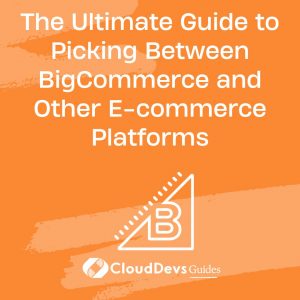The Ultimate Guide to Picking Between BigCommerce and Other E-commerce Platforms
In the modern world of e-commerce, picking the right platform can mean the difference between success and obscurity. Among the various platforms, BigCommerce has emerged as a prominent player, offering powerful features and functionality. But how does it stack up against other leading e-commerce platforms? Let’s delve into the specifics of BigCommerce and compare it with some of its top competitors: Shopify, WooCommerce, and Magento.
1. BigCommerce
Overview:
BigCommerce is a hosted e-commerce solution that caters to businesses of all sizes. It is renowned for its robust out-of-the-box features, scalability, and ease of use.
Pros:
– No Transaction Fees: Unlike many other platforms, BigCommerce doesn’t charge transaction fees.
– Built-in Features: Offers a wide array of built-in features, eliminating the need for numerous third-party apps.
– Scalability: BigCommerce is designed to grow with your business, accommodating increased traffic and orders with ease.
– SEO and Marketing: Comprehensive SEO tools and integrations with popular marketing platforms are available.
Cons:
– Pricing: Some users find the platform slightly expensive, especially for advanced plans.
2. Shopify
Overview:
Shopify is one of the most popular e-commerce platforms globally, known for its simplicity and vast app ecosystem.
Pros:
– User-friendly: With its intuitive interface, setting up and managing an online store is straightforward.
– App Ecosystem: Shopify’s app store is vast, offering integrations and plugins for virtually any need.
– Themes: A wide range of customizable, mobile-responsive themes.
Cons:
– Transaction Fees: Unless you use Shopify Payments, you’ll incur transaction fees.
– Customization: Advanced customizations might require familiarity with Shopify’s proprietary coding language, Liquid.
Example: Kylie Cosmetics, the makeup brand by Kylie Jenner, runs on Shopify, handling millions in sales during product drops.
3. WooCommerce
Overview:
WooCommerce is an open-source WordPress plugin, making it a perfect solution for those already familiar with WordPress.
Pros:
– Customizability: Being open-source, you have total control over your store’s code and appearance.
– Cost: The basic plugin is free, though premium themes and plugins may have costs.
– Large Community: With its wide user base, community support, and abundant resources are available.
Cons:
– Complexity: It can be a bit complex for beginners, especially those unfamiliar with WordPress.
– Maintenance: You are responsible for updates, security, and hosting.
Example: Porter & York, a brand offering fresh meat delivery, utilizes WooCommerce to serve its client base efficiently.
4. Magento
Overview:’
Magento, an Adobe company, offers both an open-source platform (Magento Open Source) and a cloud-based enterprise solution (Magento Commerce).
Pros:
– Customizability: Like WooCommerce, being open-source means vast customization possibilities.
– Scalability: Magento can handle large businesses and massive amounts of traffic.
– Extensive Features: Offers a wide array of features, especially for B2B businesses.
Cons:
– Complexity: Magento has a steep learning curve, requiring development expertise.
– Cost: The enterprise version can be quite expensive, and hosting for the open-source version can add up.
Example: Ford, the automotive giant, uses Magento for its official merchandise store.
Conclusion
The decision between BigCommerce and other e-commerce platforms largely depends on your business’s specific needs:
– If you want an all-in-one, easy-to-use solution with numerous built-in features, BigCommerce might be the best fit.
– Those looking for a user-friendly platform with a vast app ecosystem might lean towards Shopify.
– If you’re already a WordPress user and value extreme customization, WooCommerce is a strong contender.
– For large enterprises needing a robust, scalable solution, Magento is worth considering.
Whichever platform you choose, ensure it aligns with your business goals, budget, and technical expertise. As e-commerce continues to evolve, so too will these platforms, each offering unique solutions for diverse business needs.
Table of Contents







